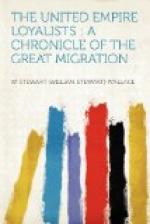In the negotiations leading up to the Peace of Versailles there were no clauses so long and bitterly discussed as those relating to the Loyalists. The British commissioners stood out at first for the principle of complete amnesty to them and restitution of all they had lost; and it is noteworthy that the French minister added his plea to theirs. But Benjamin Franklin and his colleagues refused to agree to this formula. They took the ground that they, as the representatives merely of the Continental Congress, had not the right to bind the individual states in such a matter. The argument was a quibble. Their real reason was that they were well aware that public opinion in America would not support them in such a concession. A few enlightened men in America, such as John Adams, favoured a policy of compensation to the Loyalists, ’how little soever they deserve it, nay, how much soever they deserve the contrary’; but the attitude of the great majority of the Americans had been clearly demonstrated by a resolution passed in the legislature of Virginia on December 17, 1782, to the effect that all demands for the restitution of confiscated property were wholly inadmissible. Even some of the Loyalists had begun to realize that a revolution which had touched property was bound to be permanent, and that the American commissioners could no more give back to them their confiscated lands than Charles ii was able to give back to his father’s cavaliers the estates they had lost in the Civil War.
The American commissioners agreed, finally, that no future confiscations should take place, that imprisoned Loyalists should be released, that no further persecutions should be permitted, and that creditors on either side should ‘meet with no lawful impediment’ to the recovery of all good debts in sterling money. But with regard to the British demand for restitution, all they could be induced to sign was a promise that Congress would ’earnestly recommend to the legislatures of the respective states’ a policy of amnesty and restitution.
In making this last recommendation, it is difficult not to convict the American commissioners of something very like hypocrisy. There seems to be no doubt that they knew the recommendation would not be complied with; and little or no attempt was made by them to persuade the states to comply with it. In after years the clause was represented by the Americans as a mere form of words, necessary to bring the negotiations to an end, and to save the face of the British government. To this day it has remained, except in one or two states, a dead letter. On the other hand it is impossible not to convict the British commissioners of a betrayal of the Loyalists. ‘Never,’ said Lord North in the House of Commons, ’never was the honour, the humanity, the principles, the policy of a nation so grossly abused, as in the desertion of those men who are now exposed to every punishment that desertion and poverty can inflict, because they




